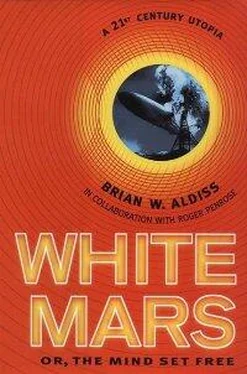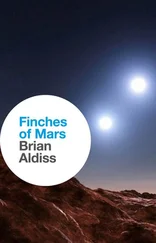Brian Aldiss - White Mars
Здесь есть возможность читать онлайн «Brian Aldiss - White Mars» весь текст электронной книги совершенно бесплатно (целиком полную версию без сокращений). В некоторых случаях можно слушать аудио, скачать через торрент в формате fb2 и присутствует краткое содержание. Год выпуска: 1999, ISBN: 1999, Издательство: Little, Brown UK, Жанр: Фантастика и фэнтези, на английском языке. Описание произведения, (предисловие) а так же отзывы посетителей доступны на портале библиотеки ЛибКат.
- Название:White Mars
- Автор:
- Издательство:Little, Brown UK
- Жанр:
- Год:1999
- ISBN:0-316-85243-0
- Рейтинг книги:5 / 5. Голосов: 1
-
Избранное:Добавить в избранное
- Отзывы:
-
Ваша оценка:
- 100
- 1
- 2
- 3
- 4
- 5
White Mars: краткое содержание, описание и аннотация
Предлагаем к чтению аннотацию, описание, краткое содержание или предисловие (зависит от того, что написал сам автор книги «White Mars»). Если вы не нашли необходимую информацию о книге — напишите в комментариях, мы постараемся отыскать её.
White Mars — читать онлайн бесплатно полную книгу (весь текст) целиком
Ниже представлен текст книги, разбитый по страницам. Система сохранения места последней прочитанной страницы, позволяет с удобством читать онлайн бесплатно книгу «White Mars», без необходимости каждый раз заново искать на чём Вы остановились. Поставьте закладку, и сможете в любой момент перейти на страницу, на которой закончили чтение.
Интервал:
Закладка:
Unfortunately the hospital permitted me no luxury of peace. Almost as soon as I was delivered I was sent back into society. That was Fangold’s doing. The move upset my child for a short while, and then she recovered.
Kathi sent me a message from the science unit. It said, “Did you succumb to Tom or to society? Why are you pretending to yourself you are an ordinary person? Better to pretend to be extraordinary. Kathi.”
It was not very kind.
Following the birth of Alpha, I—and I hope Tom too—was in a trance of happiness. His sorrow for the death of his wife was not forgotten, but he had put it behind him; he accepted her loss as one of those sorrows inescapable from our biological existence. Although I knew that one day terrestrial ships and business would return, I always hoped that day would be far off, so that our wonderful experience of finding our real selves could continue unabated.
My cloud of contentment was increased by a slogan I passed almost every day. Outside the hairdresser’s salon someone had painted VIOLENCE BEGETS VIOLENCE—PEACE BEGETS PEACE. The words might have come from my heart.
Belle Rivers seemed to increase in stature. Her Becoming Individual sessions, which parents often attended with their children, as I soon did with Alpha, were perceived to contain much wisdom, which at first appeared uncomfortably to challenge the unity of the self. The significance of archetypes playing distinct roles in our unconscious was difficult for many people to grasp at first. Gradually more and more people became absorbed in the symbolic aspects of experience.
Belle said, magisterially, “We begin to understand how health springs from our being lived, in a sense, as well as living, and from accepting that we act out traditional roles. On Mars we shall come to require new ground rules.”
During the term of my pregnancy I used to wonder about this remark. I wanted to be different. I wanted things to be different.
I discussed this point with Ben Borrow. Ben was a smooth YEA who had done his community service on Luna and was, in his own words, “into spirituality”. However that might be, it was noticeable that he was a devoted disciple of Belle Rivers, often closeted late with her.
“The more we feel ourselves lived, the more we can live independently.”
The melding of opposites, spirit/matter, male/female, good/evil, brings completeness.”
“Only technology can free us from technology.”
“True spirituality can only be achieved by looking back into green distance.”
These were some of Borrow’s sayings. I wrote them down.
He was intent on becoming a guru; even I could see he was also something of a creep. He had a tiny little pointed beard.
Under the tutelage of his powerful mistress, Borrow started a series of teach-ins he called Sustaining Individuality. These were well attended, and often became decidedly erotic. Rivers and Borrow taught that neurophysiological processes in the mind-body, such as dreaming, promoted the integration of limbic system dramas, thus increasing awareness and encouraging cognitive and emotive areas to merge. As there are swimmers in oceans who fear the unknown creatures somewhere below, beyond their knowledge, so there were those who feared the contents of the deeper levels of mind; they gradually lost this culturally induced phobia to enjoy a blossoming of awareness.
After one of these teach-ins I had to tell Borrow that I didn’t know whether or not my awareness was blossoming. How could I tell?
“Perhaps,” he said, matching finger-tip with finger-tip in front of him, “one might say that the aware find within themselves an ability to time-travel into the remote phylogenic past, and discover there wonderful things that give savour to reason, richness to being.
“Not least of these elements is a unity with nature and instinctive life, from which a knowledge of death is absent. Consciousness is something so complex and sensuous that no artificial intelligence could possibly emulate it. Don’t you think?”
“Mmm,” I said. He hurried off, still with finger-tip touching finger-tip. It was not quite the way you put your hands together in prayer. Perhaps he wanted to indicate that he was in touch with himself.
And didn’t wish to be in touch with me.
Our community became locked into this physiological-biological-philosophical type of speculation. Humanity’s spiritual attainments, together with their relationship with our lowly ancestral origins, produced problems of perception. If what we perceive is an interpretation of reality, rather than reality itself, then we must examine our perceptions. That much I understand. But since it’s our unconscious perceptual faculties that absorb and sort out our lifelong input of information, how does our conscious mind make them comprehensible? What does it edit out? What do they edit out between them? What vital thing are we missing?
I asked this question of May Porter, who came to give a short talk about perceptual faculties.
She said, “Ethology has shown that all animals and insects are programmed to perceive the world in specific ways. Thus each species is locked into its perceptual umwelt. Facts are filtered for survival. Non-survival-type perceptions are rejected. An earlier mystic, Aldous Huxley, cited the case of the frog, whose perceptions cause it to see only things that move, such as insects. As soon as they stop moving, the frog ceases to see them and can look elsewhere. ‘What on earth would a frog’s philosophy be—the metaphysics of appearance and disappearance?’ Huxley asks himself.
“Similarly Western humanity values only that which moves; silence and stillness are seen as negative, rather than positive, qualities.”
I was thinking of Kathi’s remarks when I asked May, “What if there was a higher consciousness on Mars that we were not trained to perceive?”
She gave a short laugh. “There is no higher consciousness on Mars. Only us, dear.”
These and many more understandings had a behavioural effect on our community. Certainly we became more thoughtful, if by thought we include pursuing visions. It was as if by unravelling the secrets of truly living we had come up against the tantalising conundrum of life itself, and its reasons, which were beyond biology. Single people or couples or families preferred to live alone, combining with others only on special occasions, such as a new performance of My Culture or a Sustaining Individuality session.
Thus most people came to live as individually as limited space would permit. As a would-be Utopia, it was non-authoritarian, in distinct contrast to Plato’s definition of a good place.
Nor do I imply that a sense of community was lost. We still ate together once or twice a day. It happened that many a time I caught the jo-jo bus to work with Alpha in my arms and found the whole place humming and vibrating like a hive; so many people were doing pranayama yoga on their own, uttering the eternal “Om”.
Oh, then how happy I was! For me it was the best period of our Martian existence, too sensitive, too in-dwelling to prove permanent. I clutched my dear child in my arms and thought, “Surely, surely Mars people will never again be as united as this!”
Since all our teach-in and community sessions were videoed, beamed to Earth, and saved, we could check on our progress towards individuality. Many of us had to chuckle at our earlier selves, our naive questions, our uncertainty.
We were moving towards a degree of serenity when I received a nasty little shock. I caught on my globe an Ambient exchange between Belle Rivers and my beloved Tom.
She was saying, “… on Earth. And there’s a scientist by name Jon Thorgeson. He says he wants to talk to Cang Hai. He says she suggested he might give a lecture about the Omega Smudge to us plebs. Is that okay by you?”
Читать дальшеИнтервал:
Закладка:
Похожие книги на «White Mars»
Представляем Вашему вниманию похожие книги на «White Mars» списком для выбора. Мы отобрали схожую по названию и смыслу литературу в надежде предоставить читателям больше вариантов отыскать новые, интересные, ещё непрочитанные произведения.
Обсуждение, отзывы о книге «White Mars» и просто собственные мнения читателей. Оставьте ваши комментарии, напишите, что Вы думаете о произведении, его смысле или главных героях. Укажите что конкретно понравилось, а что нет, и почему Вы так считаете.










